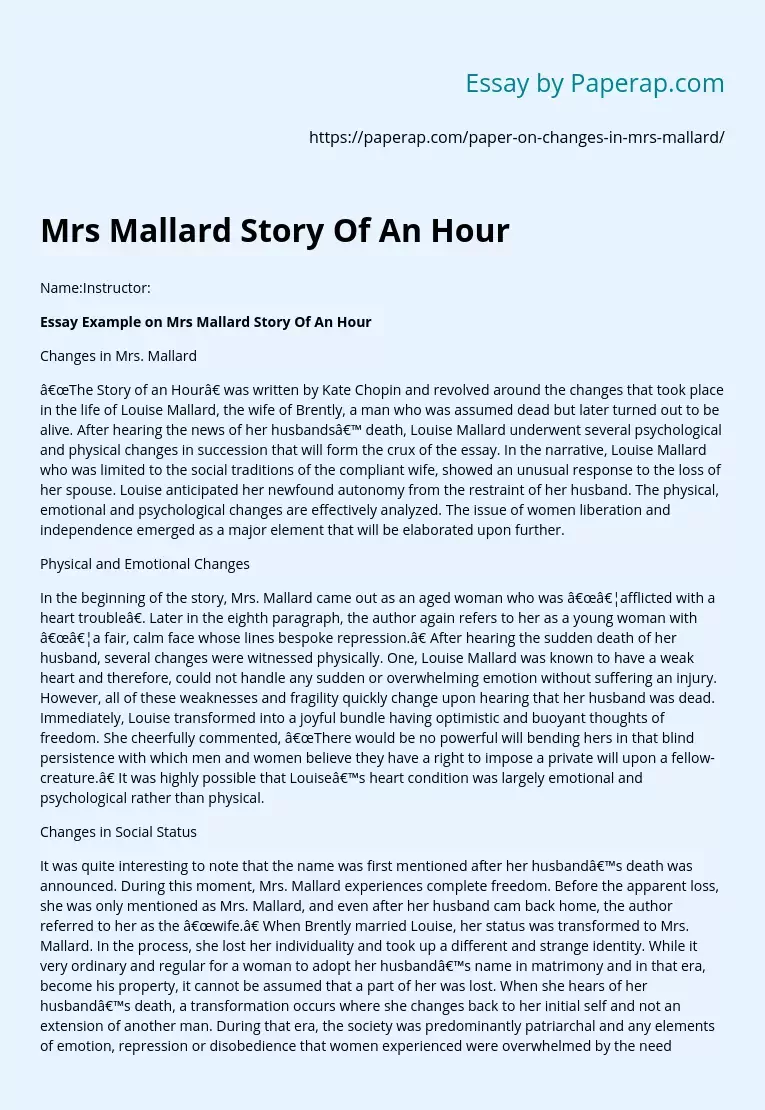Mrs Mallard Story Of An Hour
Name:Instructor:
Essay Example on Mrs Mallard Story Of An Hour
Changes in Mrs. Mallard
“The Story of an Hour” was written by Kate Chopin and revolved around the changes that took place in the life of Louise Mallard, the wife of Brently, a man who was assumed dead but later turned out to be alive. After hearing the news of her husbands’ death, Louise Mallard underwent several psychological and physical changes in succession that will form the crux of the essay.
In the narrative, Louise Mallard who was limited to the social traditions of the compliant wife, showed an unusual response to the loss of her spouse. Louise anticipated her newfound autonomy from the restraint of her husband. The physical, emotional and psychological changes are effectively analyzed. The issue of women liberation and independence emerged as a major element that will be elaborated upon further.
Physical and Emotional Changes
In the beginning of the story, Mrs. Mallard came out as an aged woman who was “…afflicted with a heart trouble”.
Later in the eighth paragraph, the author again refers to her as a young woman with “…a fair, calm face whose lines bespoke repression.” After hearing the sudden death of her husband, several changes were witnessed physically. One, Louise Mallard was known to have a weak heart and therefore, could not handle any sudden or overwhelming emotion without suffering an injury. However, all of these weaknesses and fragility quickly change upon hearing that her husband was dead. Immediately, Louise transformed into a joyful bundle having optimistic and buoyant thoughts of freedom.
She cheerfully commented, “There would be no powerful will bending hers in that blind persistence with which men and women believe they have a right to impose a private will upon a fellow-creature.” It was highly possible that Louise’s heart condition was largely emotional and psychological rather than physical.
Changes in Social Status
It was quite interesting to note that the name was first mentioned after her husband’s death was announced. During this moment, Mrs. Mallard experiences complete freedom. Before the apparent loss, she was only mentioned as Mrs. Mallard, and even after her husband cam back home, the author referred to her as the “wife.” When Brently married Louise, her status was transformed to Mrs. Mallard. In the process, she lost her individuality and took up a different and strange identity. While it very ordinary and regular for a woman to adopt her husband’s name in matrimony and in that era, become his property, it cannot be assumed that a part of her was lost. When she hears of her husband’s death, a transformation occurs where she changes back to her initial self and not an extension of another man. During that era, the society was predominantly patriarchal and any elements of emotion, repression or disobedience that women experienced were overwhelmed by the need to be dutiful, loyal, obedient and content wives. Chopin states that Louise knew that he husband “…never looked at her save with love.” When the news that her husband had apparently died, Mrs. Mallard underwent a social change from a human being bound into an irreversible contract with a man into Louise, a woman who was free to make her own decision without the weight of social accountability to her husband bearing upon her.
There is a strong sense of irony, surprise and unpredictable reactions and events that are exhibited by Louise Mallard when face with the possibility of being a widow. The unexpected reaction shown by Louise represents the mixed feeling that most married women harbor in their hearts. While it is obvious that any loving wife should mourn the death of their husband, most would automatically see the death as an opportunity to express their true selves as women. The short story touched on a global issue of women liberation and independence that was probably the rationale behind the overjoyed nature of Mrs. Mallard after hearing the sad news.
Mrs Mallard Story Of An Hour. (2019, Nov 27). Retrieved from https://paperap.com/paper-on-changes-in-mrs-mallard/

